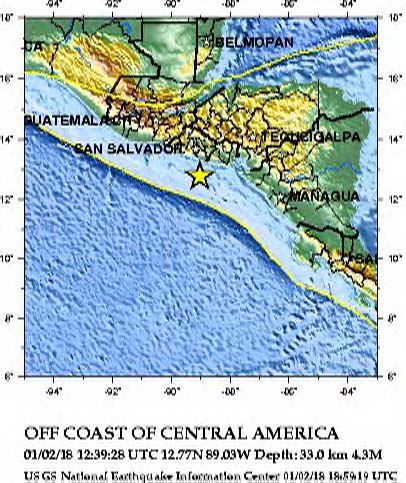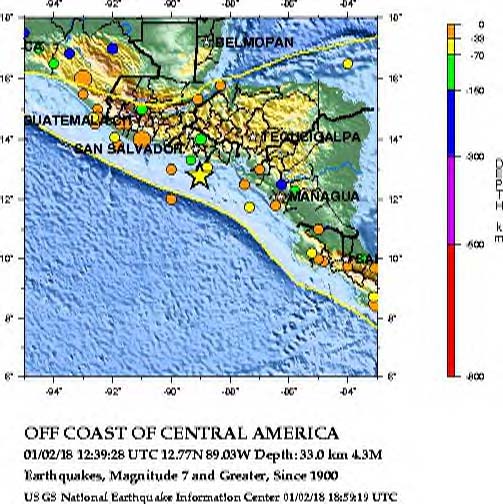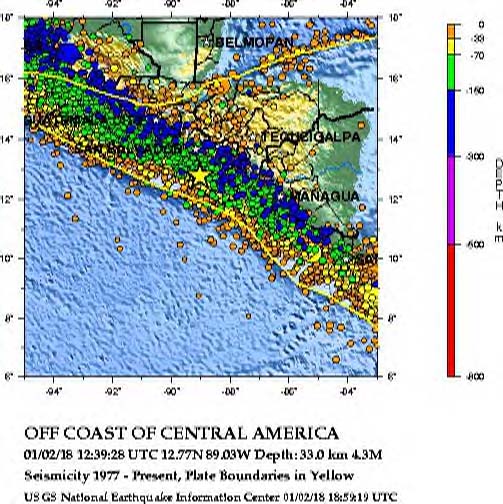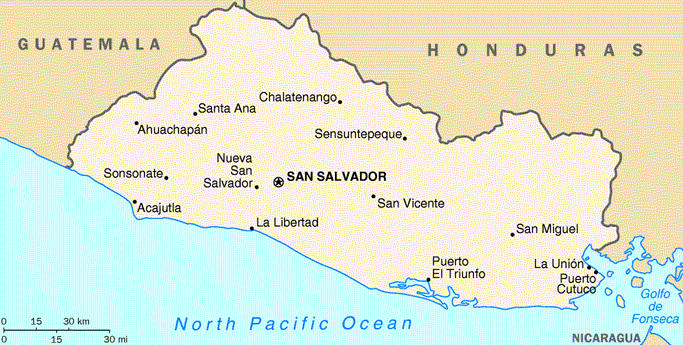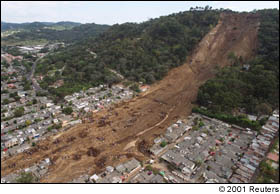| Saturday February 17, 2001
El Salvador Earthquake Turns Deadly
By JULIE WATSON, Associated Press Writer
SAN SALVADOR, El Salvador (AP) - A sharp earthquake rattled El Salvador's
capital Saturday, killing at least one person and fraying nerves in a nation
already stricken by two deadly quakes and thousands of aftershocks this year.
Crowds of people, some weeping, ran into the streets after the quake hit
with a sudden thud at about 2:25 p.m. local time, sending ominous clouds
of dust rising from the crater of the San Salvador (news - web sites) Volcano
overlooking the city.
The government reported one death and three injuries and said the quake set
off scattered landslides. Two people were pulled alive from the ruins of
a house in Apopa, north of San Salvador.
The quake had a magnitude of 5.3 and was centered just south of the capital,
the National Emergency Committee said. It created further anxiety for San
Salvador, where two earlier quakes killed more than 1,200 people.
``If we are going to die, let us die now,'' said taxi driver Daniel Santos,
fed up by the shuddering earth. ``This is torture.''
A 7.6-magnitude earthquake on Jan. 13 killed at least 844 people and damaged
or destroyed 278,000 dwellings. Exactly one month later, a 6.6-magnitude
quake killed at least 402, injured 3,153 and destroyed 45,000 homes.
There have been thousands of aftershocks in recent weeks, several of them
with a magnitude of 5 or greater.
``I'm panicked. I feel like we've been afflicted,'' said Esmeralda Mendoza,
26. She stood almost frozen outside a pharmacy, still trembling almost an
hour after Saturday's quake. ``This is going to finish off El Salvador.''
With the national government bombarded with complaints of sluggishness and
overwhelmed by red tape, local mayors have been taking charge - an unusual
step in a highly centralized country.
Local officials in Santa Tecla, where hundreds died in a landslide set off
by the January quake, began negotiating with foreign donors and distributing
aid before national leaders were organized.
After a brief squabble, the national government announced aid would be channeled
through mayors - though it complicated the task by promising aid that had
not yet arrived in local hands.
Several mayors were attacked by mobs of desperate disaster victims who believed
they were holding back help.
Mayors who in the past hardly made a move without consulting national officials
now are negotiating directly with foreign governments and aid groups.
``We're seeing organizations pick a town to rebuild rather than just sending
aid to the country,'' said Cesar Martinez, spokesman for the Foreign Ministry.
President Francisco Flores heads to Europe in the coming days to plead a
second time for emergency funds. The government says it needs $3 billion
dollars to get the country back on its feet.
The main opposition party, the former guerrillas of the Farabundo Marti National
Liberation Front, started its own plan for reconstruction and has clashed
with the government about how aid should be handled.
~~~~~~~~~~~~~~~~
Saturday February 17, 2001
Salvadoran Ground Said Too Unstable
By JULIE WATSON, Associated Press Writer
VERAPAZ, El Salvador (AP) - The body of Fabian Miranda Enrique's 18-year-old
son was one of the last to be unearthed from a coffee plantation buried in
landslides triggered by El Salvador's second strong earthquake in a month.
Rescuers are almost certain that more bodies lie beneath the dislodged mountains
of dirt, but with aftershocks around the Chichontepec Volcano provoking fears
of additional landslides, they may not be able to find them.
``We believe that they're dead, and it's not worth risking a rescuer's life
if the ground is unstable,'' said Maj. Julio Cesar Serrano Lopez.
Strong tremors continued to rock the country Friday and led rescue crews
to pull back on the recovery of bodies three days after Tuesday's 6.6-magnitude
quake. On Thursday alone, there were 203 tremors registered.
The quake struck just as the country began to recover from a devastating
7.6-magnitude temblor on Jan. 13 that left at least 844 dead, including hundreds
of residents in the city of Santa Tecla who were buried under a landslide.
The death toll from Tuesday's quake has climbed above 300.
Rescuers already have unearthed more than a dozen bodies from numerous coffee
plantations along the slopes of the volcano.
At least eight additional bodies, including one of Enrique's other sons,
are still believed to be buried at the El Carmen coffee plantation.
Enrique, his arm in a cast and his head bandaged under a straw hat, was to
fly on a helicopter to point out to the army where the buried workers might
be. However, officials said it was unlikely they would begin digging until
the tremors died down.
While Enrique and thousands of other residents mourned lost family members,
survivors contemplated the long-term process of rebuilding - a daunting task
in a country plagued by deep poverty.
The town of Verapaz, which used to have 1,949 houses, virtually all made
of adobe, or clay-based bricks, has 20 left standing. Of 20 businesses, two
remain.
Guillermo Antonio, 33, lives with eight relatives under two plastic tarps
in San Cayetano on the outskirts of Verapaz.
``We need bricks and metal (roofing) to rebuild because I am not going to
use adobe,'' he said. ``But even if I had the materials, I wouldn't start
now. I am going to wait until it stops trembling.''
He said relatives had brought some food from other towns and people in pickups
have offered some more. The army brought in a tank of water.
Government health worker Teresa de Jesus Naboa told Verapaz Mayor Valentin
Armando Alfaro that people were drinking muddy well water and that children
were searching through garbage for food.
El Salvador plans to send a delegation to Spain to ask for help from the
Consultative Group, an association of international finance groups.
A study by two private groups said the quakes Jan. 13 and Feb. 13 caused
$3 billion in damage.
~~~~~~~~~~~~~~~~~~~~~~
Friday February 16, 2001
Quake Aftershocks Raise Fears
By JULIE WATSON, Associated Press Writer
VERAPAZ, El Salvador (AP) - Aftershocks around the Chichontepec Volcano have
raised fears of more landslides and after two days of searching for victims
of this week's deadly earthquake, rescue crews were pulling back Friday.
There were 203 aftershocks registered Thursday, two days after a magnitude-6.6
earthquake devastated large sections of central El Salvador.
Fabian Miranda Enrique, 64, buried his 18-year-old son on Friday. He was
one of the last to be pulled out of a landslide at the El Carmen coffee
plantation on the flanks of the volcano, where eight others are still believed
buried, including one of Enrique's other sons.
Rescuers already have unearthed more than a dozen bodies from numerous
plantations along the volcano's slopes that were hit by landslides.
Enrique, his arm in a cast and his head bandaged under a straw hat, waited
Friday to go on a helicopter to point out to the army where the buried workers
at the El Carmen plantation might be.
Maj. Julio Cesar Serrano Lopez said crews would fly over the area with Enrique
but that it was unlikely they would go back to try to rescue victims from
the plantation, which is owned by former Salvadoran President Alfredo Cristiani.
``We believe that they're dead and it's not worth risking a rescuer's life
if the ground is unstable,'' he said.
Verapaz, which had 1,949 houses, virtually all of adobe, has 20 left standing.
Of 20 businesses, two remain.
``We need bricks and metal (roofing) to rebuild because I am not going to
use adobe,'' said Guillermo Antonio, living in a temporary shelter on the
outskirts of Verapaz. ``But even if I had the materials I wouldn't start
now. I am going to wait until it stops trembling.''
Villagers in the area went to the roadside Friday to yell for help at passing
cars.
Long lines formed at mayors' offices in the quake zone to ask for building
materials and other aid.
Government health worker Teresa de Jesus Naboa told Verapaz Mayor Valentin
Armando Alfaro that people were drinking muddy well water from a coffee
plantation and that children were searching through garbage for food.
President Francisco Flores, meanwhile, said he will not join with former
guerrillas, the second political force in the country, to make a joint push
for more international aid.
El Salvador plans to send a delegation to Spain to ask for help from the
Consultative Group, an organization of international finance organizations.
A study by the Salvadoran Foundation for Economic and Social Development
and the National Association for Private Enterprise concludes that the quakes
Jan. 13 and Feb. 13 caused $3 billion in damage.
After the first quake, Flores assigned aid distribution to militants of his
conservative National Republican Alliance and the National Association of
Private Enterprise.
Some suggested that the president also invite representatives of the Roman
Catholic Church, humanitarian groups and the former guerrilla Farabundo Marti
National Liberation Front.
The government accused them of trying to politicize the crisis.
The Front started its own plan for reconstruction and publicized its proposal
to join the delegation to Madrid.
In a meeting with business leaders, Flores said they should not expect him
to return from the March 7 meeting ``with full pockets.''
He recalled expectations of $1.8 billion in aid from the group after Hurricane
Mitch in 1998. His country got $300 million.
~~~~~~~~~~~~~~~~~~~~
Sunday, 18 February, 2001,
El Salvador to renew quake appeal
Parts of El Salvador remain strewn with rubble
El Salvador's President Francisco Flores is to visit Europe in the next few
days to seek further emergency funds after his country's third big earthquake
in a month.
The latest tremor, which measured 5.1 on the Richter scale, struck on Saturday
spreading panic and triggering landslides. No fatalities have been reported.
President Flores will make a personal appeal for help
It was the latest in series of aftershocks following two major quakes on
13 February and 13 January in which at least 1,000 people died and more than
one million people were left homeless.
The BBC's Fiona Werge says the need for aid has become all the more urgent
as El Salvador's rainy season is due to start soon.
Damage from the January quake alone is estimated to be at least $1.3 bn -
over 15% of the country's annual economic output.
Following the latest tremor, President Flores appeared on radio and television
urging residents of the capital, San Salvador, to remain calm.
"I want to tell the residents of the capital that I am near you, maintaining
a state of continuous alert with a monitoring operation," he said.
Reports of rumbling
The latest quake's epicentre was about three miles (5km) from San Salvador,
along a fault line in the San Hasinto hill.
One million people have been left homeless
"It felt very strong, and then I saw a big dust cloud on the volcano," said
Jose Canizales, from Canton Alvarez, a small village on the slopes of the
volcano overlooking the capital.
People living close to the hillsides on the south side of the city have been
reporting rumbling sounds coming from inside since last Tuesday's earthquake.
There were reports of three landslides at communities in the east of the
country. Several main roads are reported to have been cut off.
Hundreds of people died in the other quakes
However, Red Cross and emergency officials said earlier reports of people
trapped under landslides have proved to be untrue.
Although damage from the latest tremor appears to be relatively light, El
Salvador's devastated roads, communications and water supplies have yet to
be repaired.
The country has still to recover from the damage caused by Hurricane Mitch
three years ago, and just in time to wreck President Flores economic reforms.
|
